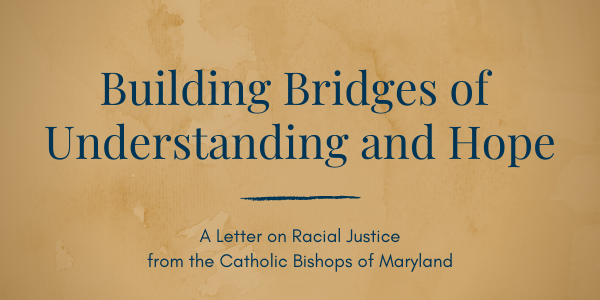America Magazine recently published this column by Archbishop Lori examining the meaning of the phrase “Black Lives Matter” from the perspective of Catholic Social Teaching:

June 15, 2020
Dear Brothers and Sisters in Christ,
For centuries, our country and our State have been plagued with problems of racial inequality and injustice. Although many people have acted in good faith in service and prayer to bring about just change, to acknowledge the dignity of each life, and to love one another, our current crisis causes us to reflect on how much we still must do together to make impactful progress. We vividly recall our own Church’s past sins and failings and admit to them freely.
With regret and humility, we must recognize that as Catholic leaders and as an institution we have, at times, not followed the Gospel to which we profess and have been too slow in correcting our shortcomings. For this reason, it is incumbent upon us to place ourselves at the forefront of efforts to remove the inequalities and discrimination that are still present in Maryland and our nation today.
Despite our painful history, the Church in Maryland has been deeply enriched by the gifts of Black Catholics. We think of Mother Mary Lange, who founded the first Catholic school for Black children in the United States, in Baltimore in 1828. One year later, she founded the Oblate Sisters of Providence, the first religious order for women of African descent. Today, she is a Servant of God, in the process to be canonized a Catholic saint, a cause for which all Catholics should pray.
Maryland is also home to the National Black Catholic Congress, which acts as a witness and guide to the realities of the Black Catholic experience across the United States. It is also home to the Josephite priests and brothers, whose mission is to serve the African American community.
At a time when school segregation, sadly, was the norm in Maryland, two of our predecessors – Cardinal Patrick O’Boyle and Cardinal Lawrence Shehan – began the process of desegregating Catholic schools and parishes.
On March 12, 1950, in a homily on race relations, then-Archbishop O’Boyle said, "Unless the full resources of the Church are placed at the disposal of every single member of the church and made available to every man, there is no Catholicism worthy of the name. Our Sacraments, and our societies, our Mass and mysteries of the Faith are a common possession. Just as God is Our Father – What is Catholic is ours; it is all of us united as one."
This history provides the context for us today and should act to animate our prayers, thoughts and actions for an end, finally, to the sin of racism that remains with us and in us. The unjust killing of George Floyd and other Black Americans, and the subsequent protests, rallies and vigils that continue to take place make it clear that the conscience of our nation is on trial as questions of race and equality confront each and every one of us.
We must recognize that all of us share the same human nature and dignity because we are all created in the image and likeness of God; this is why human life is sacred. We call all people of good will to prayer, to root out any hatred and animosity that has taken hold in one’s own heart. Inspired by Jesus’ command to “love one another as I love you” (John 15:12), we must seek to know and understand one another and to work to break down barriers through listening, prayer and a commitment to change hearts and minds.
However, prayer and dialogue, alone, are not enough. We must act to bring about true change. United, we seek healing, harmony and solutions that recognize that every person has been created in the image of God and that every person possesses human dignity. Over the years, the Catholic Bishops of Maryland have stood firmly in our support of laws that sought to bring about justice and an end to unequal treatment based on race.
This includes access to health and maternal care, meaningful educational opportunities, prison reforms, restorative justice initiatives, housing anti-discrimination efforts, juvenile justice reforms, and ending the grossly disparate practice of capital punishment. We commend the efforts of our state lawmakers to convene working groups to discuss legislative initiatives that are needed for reform, transparency, and racial equality. We look forward to playing an active part in these conversations on both a state and national level, and to lending our voices to those whose own have been stifled or altogether silenced by those who seek to quiet them.
We continue to pray that the Holy Spirit will enlighten the minds and hearts of our elected representatives so that truth and justice will prevail over the falsehoods of discrimination and injustice.
We pray that God will guide us during these difficult times and give us the courage to act with conviction in our duty to seek racial equality, heal divisions, and build bridges of understanding and hope.
In Christ,
Most Reverend William E. Lori, Archbishop of Baltimore
Most Reverend Wilton D. Gregory, Archbishop of Washington
Most Reverend W. Francis Malooly, Bishop of Wilmington
Most Reverend Roy E. Campbell Jr., Auxiliary Bishop of Washington
Most Reverend Mario E. Dorsonville-Rodriguez, Auxiliary Bishop of Washington
Most Reverend Michael W. Fisher, Auxiliary Bishop of Washington
Most Reverend Adam J. Parker, Auxiliary Bishop of Baltimore
Most Reverend Denis J. Madden, Auxiliary Bishop Emeritus of Baltimore
Bishop-designate Bruce Lewandowski, CSsR, Auxiliary Bishop-designate of Baltimore
